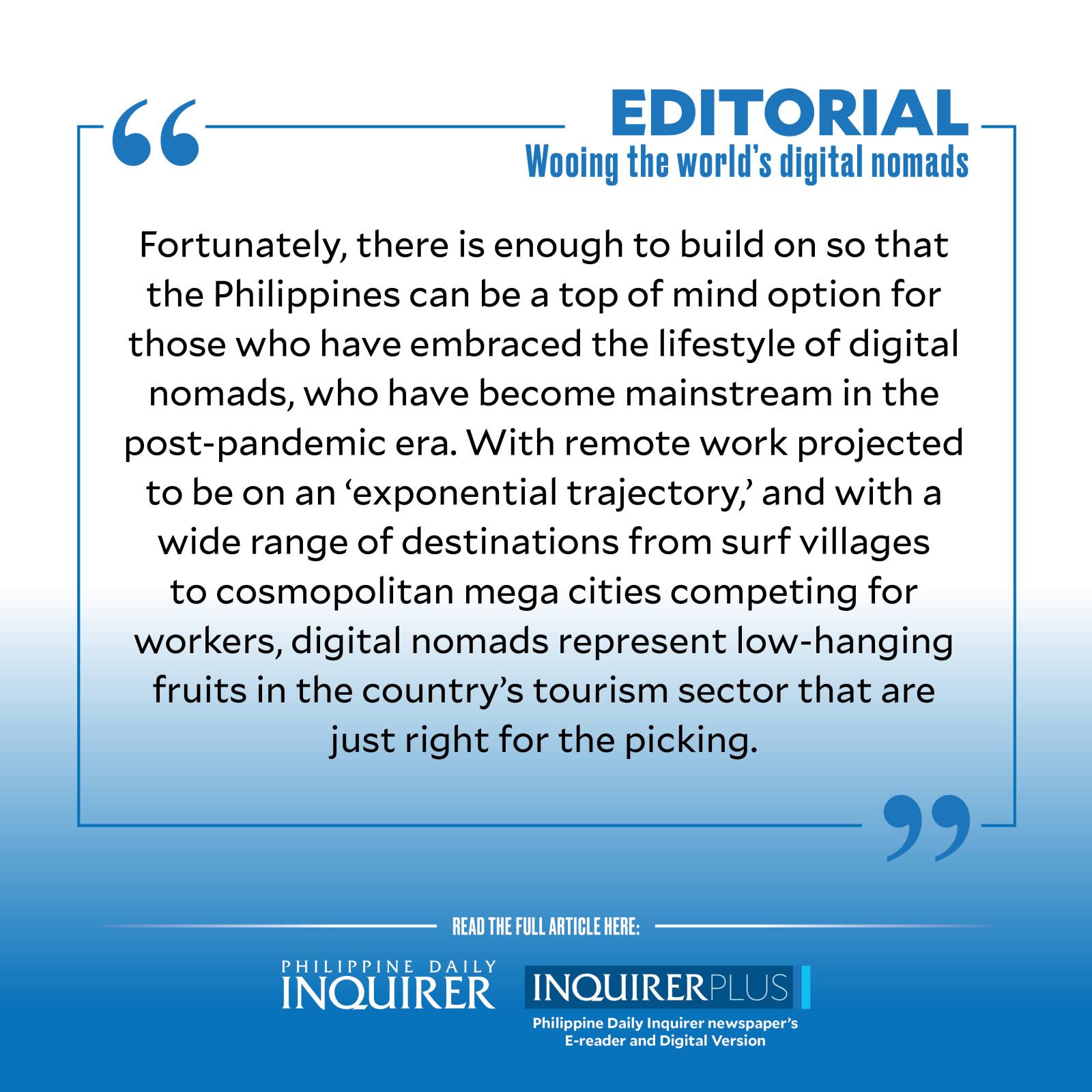Wooing the world’s digital nomads

Generally defined as those who combine remote work with a passion for frequent travel, desire for adventure, and interest in discovering new cultures, digital nomads have emerged as a lucrative niche in the country’s tourism industry.
And the Philippines seems to be on the right track to capture this market segment, having been ranked among the world’s top 10 remote work hubs for traveling workers in 2023, along with Tokyo, Japan; Da Nang in neighboring Vietnam, and Kuala Lumpur and Penang in Malaysia. The recent survey by work and travel platform Nomad List also ranked Manila as the 7th fastest-growing hub, posting a 78 percent increase in check-ins from 2018 to 2022. The platform reported that as of October this year, check-ins surged by another 60 percent, incontrovertible proof of the country’s growing appeal as a location where remote workers can live, work, and travel, based on such criteria as internet speed, cost of living, safety, and weather.
This robust growth translates to additional tourism revenue from guest accommodations, food, and transport expenses, an instant injection of funds into host towns and cities. It is thus imperative for the Marcos administration to build on this momentum and devote more resources to enhance the country’s appeal to digital nomads. With the tapering off of the COVID-19 threat, the upsurge in revenge travel has led to optimism that the number of global digital nomads would rise.
A study by human resources consultant MBO Partners indicates that digital nomads, most of them from the Gen Z generation or those born between 1997 and 2012, do not want to be tied down to a physical workplace, preferring to be self-employed as freelancers or independent contractors so that they can continue enjoying the lifestyle that easily combines work with play.
Among the initiatives that the government can put in place to take advantage of the emerging trend in this demographics is to consider a digital nomad visa that would allow those in this sector to stay longer—and spend more—in the country. Currently, 58 countries including Germany, Greece, Italy, Portugal, Spain, Norway, and Thailand offer a special visa category for digital nomads, granting those who pass an income requirement the privilege of temporarily residing in the host country for between six and 12 straight months, with the possibility of extending their stay for another six months to a year.
Surigao del Norte Rep. Francisco Jose Matugas II’s proposed Digital Nomad Act would add the Philippines to the fast-growing list of countries offering these “golden tickets” that are meant to attract this particular tourism niche. Matugas said the country’s beaches should be a “No. 1 attraction for this kind of workers” who have the money to spend for a stay far longer than the usual 30 days allowed by the current tourist visa issued them.
“The rapid development of telecommunications technology, coupled with [the] employers’ desire to seek work-life balance, has given rise to a new breed of workers, the digital nomads,” Matugas said in explaining his bill, adding that other countries have taken advantage of this phenomenon by granting these individuals an extended stay visa. Digital nomads, he noted, tend to “spend more money than tourists, don’t put much strain on public services, create jobs for locals, and even start local businesses,” welcome developments that can benefit the country.
But aside from the special visa, the Philippines, too, must ramp up internet speed across the country as this would allow digital nomads to do their remote work more efficiently, even on beaches where they are bound to hang out. While global internet speed tracker Ookla noted that internet connectivity in the Philippines has been improving, the country still ranked 79th out of 140 countries monitored for their mobile data connection. For fixed broadband connection, the Philippines dipped to 41st place out of 180 countries monitored.
In comparison, Singapore ranked first worldwide in terms of fixed broadband, and 22nd on mobile. Thailand meanwhile was 6th in fixed broadband and 53rd in mobile. Malaysia was 37th in fixed broadband and 45th in mobile, while Vietnam was 40th in fixed and 51st in mobile connection. Clearly, the Philippines will require significantly more investments to build up its telecommunications infrastructure to move up the internet speed list.
Fortunately, there is enough to build on so that the Philippines can be a top of mind option for those who have embraced the lifestyle of digital nomads, who have become mainstream in the post-pandemic era. With remote work projected to be on an “exponential trajectory,” and with a wide range of destinations from surf villages to cosmopolitan mega cities competing for workers, digital nomads represent low-hanging fruits in the country’s tourism sector that are just right for the picking.




















